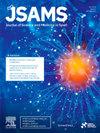Athlete wellness: Examining the risk of alcohol use disorder in collegiate athletes and non-athletes
IF 3
2区 医学
Q1 SPORT SCIENCES
引用次数: 0
Abstract
Objectives
Previous research has demonstrated that collegiate student-athletes drink more, binge drink more, and can have more alcohol-related consequences compared to non-athletes. Little is known if student-athletes are at a greater risk than non-athletes for alcohol use disorder. This study aimed to analyze disparities in alcohol use disorder risk between college athletes and non-athletes and evaluate the moderating effect of psychological well-being on this relationship.
Design
This study utilized a cross-sectional study design.
Methods
We utilized data collected between Fall 2019 and Fall 2022 from the American College Health Association National College Health Assessment version III. Data were analyzed from 220,798 participants with multiple logistic regression models to generate adjusted odds ratios for high alcohol use disorder risk.
Results
A dose–response relationship was observed in which at lower psychological well-being levels, the odds of being at high risk for alcohol use disorder increased for athletes when compared to non-athletes. As psychological well-being levels increased, the odds were attenuated. Sensitivity analyses revealed similar dose–effect relationships when moderate or high alcohol use disorder risk and a continuous risk score were used as the outcome.
Conclusions
A dose–response relationship is present between psychological well-being and alcohol use disorder risk in which lower psychological well-being is associated with higher alcohol use disorder risk for athletes compared to non-athletes. The relationship between psychological well-being and alcohol use disorder risk among collegiate athletes reveals the need for holistic interventions that address the stressors that are predisposing athletes to higher alcohol use disorder risk.
运动员健康:检查大学运动员和非运动员酒精使用障碍的风险。
目的:先前的研究表明,与非运动员相比,大学生运动员喝得更多,酗酒更多,并且可能产生更多与酒精相关的后果。很少有人知道学生运动员是否比非运动员有更大的酒精使用障碍风险。本研究旨在分析大学生运动员和非运动员在酒精使用障碍风险方面的差异,并评估心理健康对这种关系的调节作用。设计:本研究采用横断面研究设计。方法:我们利用2019年秋季至2022年秋季从美国大学健康协会国家大学健康评估III版收集的数据。采用多元逻辑回归模型分析220,798名参与者的数据,以产生高酒精使用障碍风险的校正优势比。结果:与非运动员相比,在较低的心理健康水平下,运动员患酒精使用障碍高风险的几率增加,这是一种剂量-反应关系。随着心理健康水平的提高,这种可能性就会降低。当使用中度或高度酒精使用障碍风险和连续风险评分作为结果时,敏感性分析显示类似的剂量效应关系。结论:心理健康与酒精使用障碍风险之间存在剂量-反应关系,与非运动员相比,运动员较低的心理健康与较高的酒精使用障碍风险相关。大学生运动员的心理健康与酒精使用障碍风险之间的关系揭示了需要采取整体干预措施,以解决使运动员易患更高酒精使用障碍风险的压力源。
本文章由计算机程序翻译,如有差异,请以英文原文为准。
求助全文
约1分钟内获得全文
求助全文
来源期刊
CiteScore
7.40
自引率
10.00%
发文量
198
审稿时长
48 days
期刊介绍:
The Journal of Science and Medicine in Sport is the official journal of Sports Medicine Australia (SMA) and is an an international refereed research publication covering all aspects of sport science and medicine.
The Journal considers for publication Original research and Review papers in the sub-disciplines relating generally to the broad sports medicine and sports science fields: sports medicine, sports injury (including injury epidemiology and injury prevention), physiotherapy, podiatry, physical activity and health, sports science, biomechanics, exercise physiology, motor control and learning, sport and exercise psychology, sports nutrition, public health (as relevant to sport and exercise), and rehabilitation and injury management. Manuscripts with an interdisciplinary perspective with specific applications to sport and exercise and its interaction with health will also be considered.

 求助内容:
求助内容: 应助结果提醒方式:
应助结果提醒方式:


